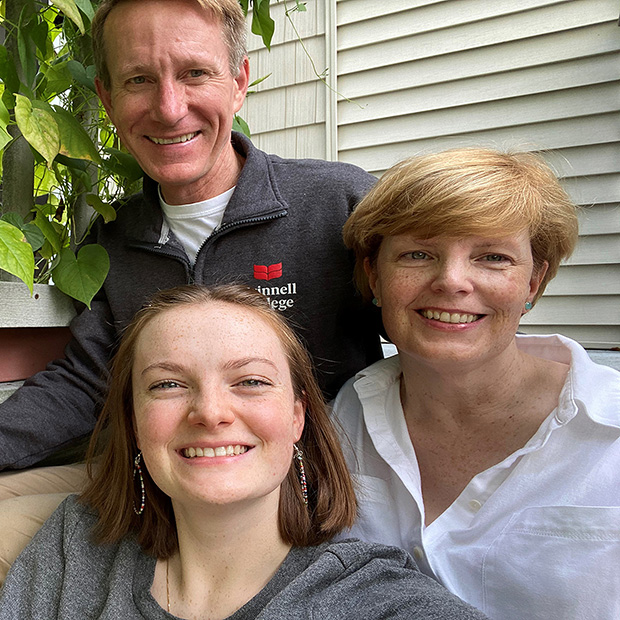Grinnell provides heartwarming experiences to Gifford family
June 15, 2021 — When Maeve Gifford ’23 chose to attend Grinnell, her parents Bret and Doreen (Doyle) Gifford ’86, were thrilled. The Manchester, New Hampshire couple felt Grinnell would be the perfect fit for Maeve.
 Maeve Gifford ’23, front,
Maeve Gifford ’23, front,
Bret and Doreen (Doyle)
Gifford ’86
But when Doreen and Maeve visited during Admitted Students Weekend, “it was minus 5 without the wind chill,” recounts Doreen, a biology major who works in marketing communications for a life sciences company. “Still, they had all these fantastic activities and the students were so good at connecting with prospective students.” When Maeve made her choice, it came down to the people. “She felt the warmth of those on campus despite the bitter cold. She took that as a sign that Grinnellians are special.”
It’s a hunch that’s proven true, even more so in a year that’s been unusually challenging.
Like her mom, Maeve lived in Norris Hall her first year, forming a tight group of friends on the second floor. “They’re the kind of people she was hoping to get to know when she chose Grinnell, and they’ve sustained and supported each other during this period of remote learning,” says Bret, a staff attorney for the New Hampshire Supreme Court. “They get together individually or in groups virtually every day, through Facetime, Zoom, and texting.”
Bret first visited Grinnell for Doreen’s 10th reunion while the two were dating, and again when Maeve looked at colleges. The family bumped into former president George Drake ’56 that weekend, reinforcing Bret’s view that Grinnell relationships are strong and long-lasting.
The couple, who joined the Parents and Families Leadership Council (PFLC) last August, have been impressed with how the College handled remote learning and other issues this past year. “The professors have kept students engaged by making themselves available at all hours of day and evening,” Bret says.
“I went to a large university where going to class meant showing up at an auditorium with a professor on stage, the professor delivers the lecture, the student takes notes and then leaves,” he adds. “That process repeats itself to the end of the semester when you’re given a blue book, write the exam, and you get back a grade. Even remotely, Maeve is interacting one-on-one with professors, having regular meetings with an assigned mentor for each class, and having informal study groups. When you add up all those interactions it really overcomes the distance involved in remote learning.”
The couple joined the leadership council to further support the College. “We feel that Grinnell responded to the pandemic by working harder and digging deeper,” says Bret, “as shown by the recent decision to eliminate loans from financial aid packages and replace them with scholarships.”
Doreen’s been impressed with decision-making when it comes to student health and safety. “Grinnell was fortunate to have Dr. [Raynard] Kington and President [Anne] Harris, who’ve made science-based decisions about what’s best in the long term for students, faculty and staff, and the community.”
She’s also pleased with Grinnell programs that help first-generation college students succeed, like the Grinnell Science Project and the Peer Connections Pre-Orientation Program (PCPOP). Doreen’s parents were from Dublin – Maeve is named after the Irish warrior queen – and immigrated to the U.S. As a first-generation college student, Doreen received help informally from the College before such programs were in place. “It’s one more thing Grinnell does to provide greater access to a liberal arts education for students of all backgrounds.”
“Grinnell stands out in the way it makes the College accessible to students of any financial background,” adds Bret. “One of the goals I’d like to help the College achieve is to increase alumni participation in giving back. Whether you’re an alum who has benefited from financial generosity, or an alum who supports that mission, you should give back whatever is in your means to recognize the financial efforts made by Grinnell. We want to show our support for the College and its efforts by doing our part.”
—by Anne Stein ’84